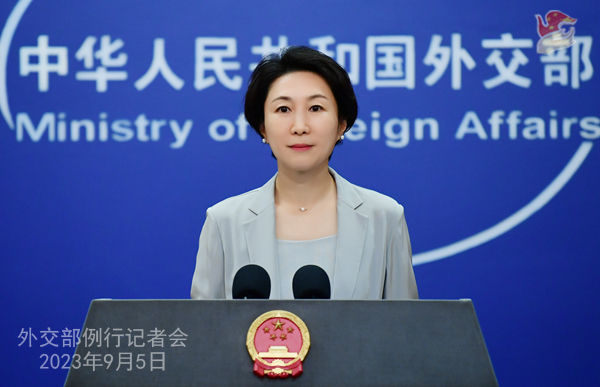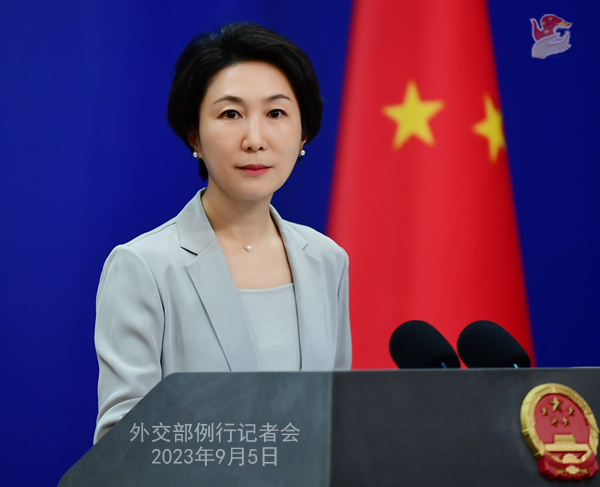| Foreign Ministry Spokesperson Mao Ning’s Regular Press Conference on September 5, 2023 |
| 2023-09-05 17:17 |
|
The Paper: At a recent press briefing, the Taiwan authorities listed “four appeals” on Taiwan’s UN participation and claimed that they would invite “diplomatic allies” to submit a joint letter to the UN Secretary-General urging him to rectify the UN’s “erroneous interpretation” of UNGA Resolution 2758. What’s your comment? Mao Ning: Taiwan is part of China. Despite that fact and legal basis, the DPP authorities have been distorting UNGA Resolution 2758, openly challenging the internationally recognized one-China principle, and spinning lies to pursue “Taiwan independence”. These are extremely dangerous separatist provocations. On October 25, 1971, the 26th session of the United Nations General Assembly adopted Resolution 2758 with an overwhelming majority, which “decides to restore all its rights to the People’s Republic of China and to recognize the representatives of its Government as the only legitimate representatives of China to the United Nations”, and to expel forthwith the representatives of the Taiwan authorities “from the place which they unlawfully occupy”. Henceforth, the “dual representation” proposal put forth by the US and a few other countries to keep Taiwan’s seat in the UN became a piece of waste paper. Once and for all, UNGA Resolution 2758 resolved, politically, legally and procedurally, the issue of the representation of the whole of China, including Taiwan, at the UN. It also made it clear that there can only be one seat representing China at the UN. No issues exist about so-called “two Chinas” or “one China, one Taiwan”. Since the adoption of UNGA Resolution 2758, it has been observed by the UN and its specialized agencies and other international and regional organizations. On the basis of the one-China principle, 182 countries have established diplomatic relations with China. The one-China principle has long been a universally recognized norm in international relations and a prevailing consensus among the international community. Any issue regarding the Taiwan region’s participation in the activities of international organizations must be addressed under the framework of the one-China principle. Taiwan has no basis, reason or right to join the UN or other international organizations that require statehood. Both sides of the Taiwan Strait belong to one and the same China. Taiwan is part of China’s territory. Although the two sides have been politically against each other for a long time, China’s state sovereignty and territorial integrity has never been split. This is the real status quo of the Taiwan question. The DPP authorities’ hype-up of Taiwan’s participation in the UN system is actually an attempt to create a false impression of “two Chinas” or “one China, one Taiwan” and challenge the UN-centered international order underpinned by international law. The DPP authorities have been promoting “incremental independence” and pushing for “de-sinicization”, while some external forces have been fudging and hollowing out the one-China principle and conniving at and supporting separatist acts for “Taiwan independence”. It is them, not anyone else, who are undermining the status quo and peace and stability across the Taiwan Strait. They are the ones responsible for disrupting the cross-Strait status quo. Let me stress that the Taiwan question is purely China’s internal affair and its resolution is a matter for the 1.4 billion Chinese on both sides of the Taiwan Strait. The DPP authorities will not succeed in seeking external support to embolden its separatist acts. UNGA Resolution 2758 must not be challenged and the one-China principle is unshakable. The wheels of history will keep rolling on. The complete reunification of our country can, without doubt, be realized. AFP: Question about Pope Francis’ comments yesterday. He said that “relations with China are very respectful, very”, while both sides needed to understand each other better, so the Chinese citizens don’t think that the church “depends on another foreign power.” What is your comment? Mao Ning: As we have previously said, China is positive towards improving its relations with the Vatican and our two sides have engaged each other and maintained communication. China practices the policy of freedom of religious belief, which is consistent with our national realities and the actual conditions of various religions in China. Kyodo News: Japan’s Ministry of Foreign Affairs announced yesterday that it had submitted a written document to the WTO, saying that the import control measures announced by the Chinese side following the release of treated water into the sea are “totally unacceptable”. What’s the Foreign Ministry’s comment? Will China hold consultations with Japan? Mao Ning: We’ve made clear China’s position on Japan’s ocean discharge of nuclear-contaminated water several times. There is no precedent for such discharge since humanity began using nuclear energy for peaceful purposes, nor is there widely recognized standards for this method of disposal. The international community is watching closely what risks Japan’s moves have brought to the marine environment and public safety, and have taken preventive measures accordingly. The measures we’ve adopted are fully legitimate, reasonable and necessary. As for the specific questions you raised, I’d refer you to the relevant authorities. Phoenix TV: The premises of the Hong Kong Economic and Trade Office in London were vandalized with red paint and the regional emblem of the Hong Kong SAR was defaced a few days ago. What is your comment? Mao Ning: The government of the Hong Kong SAR has issued a statement on this matter. China strongly condemns this egregious act. We have asked the UK for a thorough investigation and serious action to bring the perpetrators to account and effectively protect the security of the Hong Kong Economic and Trade Office in London and the safety of its staff.
Reuters: Will China accept any invitation from the US for official talks on the sidelines of the ASEAN summit in Jakarta? Will Premier Li Qiang hold talks with US Vice President Harris who is attending on President Biden’s behalf? Mao Ning: I have nothing to share. NHK: I have two questions. The first one is what is the reason of President Xi Jinping’s absence from the G20 summit in New Delhi? The second one is will he attend the Eastern Economic Forum to be held in Russia? Mao Ning: I gave my answer to your first question yesterday. On your second question, I have nothing to share. The New York Times: Countries in the West have expressed concerns about China’s stringent limits on imports of personal care products. Is China unfairly restricting these imports? Mao Ning: I’m not aware of what you said. Maybe you could ask the relevant authorities on that. Global Times: According to reports, in a recent written interview with The AP, ROK President Yoon Suk Yeol said that China “seems to have considerable leverage” over Pyongyang, and said “What really matters is whether Beijing will use its leverage, and if so, how much and in what way”. “If North Korea continues to enhance its nuclear and missile capabilities and openly violate United Nations Security Council resolutions, China, which has a responsibility to maintain international peace and stability as one of the permanent members of the Security Council, should make constructive efforts to denuclearize North Korea”, Yoon added. How do you comment on this? Mao Ning: On this question, I would like to make four points. First, as friendly neighbors, China and the DPRK enjoy long-standing friendly ties. The DPRK is a full UN member state and a sovereign and independent country. The close ties we have with the DPRK and the influence China has on the DPRK are two different things and cannot be lumped together. Second, the current situation on the Korean Peninsula does not serve anyone’s interest, nor is it something that China wants to see. The process that started in 2018 to address the Korean Peninsula issues came to a standstill fundamentally because the US has refused to respond to the denuclearization measures taken by the DPRK. Neither has the US taken the DPRK’s legitimate concerns seriously or shown readiness to address these concerns. The US needs to draw lessons, correct course, step up to its responsibility, stop heightening the pressure and sanctions, stop military deterrence, and take effective steps to resume meaningful dialogue. Third, China has faithfully implemented relevant UN Security Council resolutions. Those resolutions are not just about sanctions. They also underscore the importance of dialogue. China believes in their full and balanced implementation and opposes selectively focusing on sanctions and ignoring the dialogue process. Fourth, China is committed to upholding peace and stability of the Korean Peninsula and advancing the process of settling the Korean Peninsula issues through dialogue. China will continue to actively uphold stability, promote talks and push for the early realization of lasting peace and security on the Peninsula. This serves the common interests of all parties. The New York Times: Does the decision to send the Premier instead of the President to India reflect tensions between China and India? Mao Ning: The G20 is the premier forum for international economic cooperation. China always attaches high importance to and actively participates in relevant activities. We support India in hosting this year’s summit and stand ready to work with all parties to make the G20 summit a success. China-India relations have been stable on the whole and our two sides have maintained dialogue and communication at various levels. The continued improvement and growth of China-India relations serves the common interests of the two countries and two peoples. We stand ready to work with India to further improve and advance bilateral relations.
|
 | ||||||||||||
 | ||||||||||||
|


